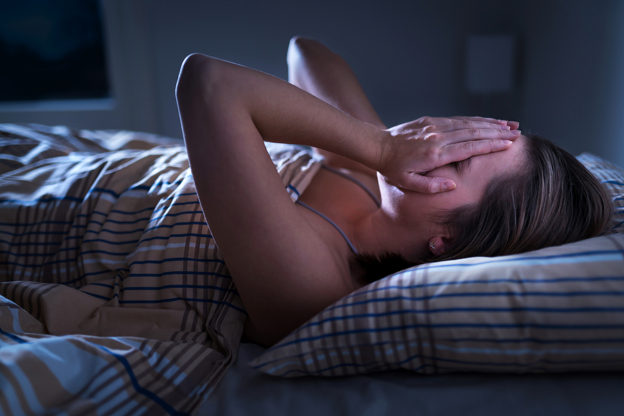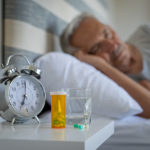By David Blyweiss, M.D., Advanced Natural Wellness
May 31, 2021
Do you ever have those nights when you just can’t sleep? And have you noticed that the older you get, the more often those nights happen?
It’s annoying, right?
In some cases, it might be caused by things like stress, brain chatter or poor bedtime habits. But the reasons for poor sleep seem to start changing when we reach a certain age. Why does that happen?
Pain is a big reason. You know the deal. You hit the hay and your arthritis flares up. Your bad neck or back starts aching. It can be something as simple as the covers sitting the wrong way on your ingrown toenail and triggering pain.
This is a real problem. You’re tired the next morning. And all of those aches and pains get you off to a slow start. You feel like your day is ruined before it even begins.
It’s interesting, because your nervous system controls how you process and feel pain. So if you can calm down your nervous system before bedtime, not only will it lower pain levels, it will also help you sleep better.
There are a few things that can act as nerve tonics to slow down those pain signals and help you sleep better. I like green tea. It contains l-theanine, which helps send me into a nice state of relaxation. It calms my nerves and ensures a good night’s sleep later on.
MD Exposes the Hidden Danger to Your Eyes

When your eyesight starts to fail, it's a real problem. Suddenly you can't go to the grocery store... you can't get to the doctor if you have an emergency... you can't meet your friends for dinner…
Your "regular" doctor doesn't have time to keep up with the latest research. And the same goes for eye doctors. They go to school to learn how to fit you for glasses and contacts, but have no way of preventing the damage and loss of eyesight that threatens your freedom and independence.
Let me show you something that explains a LOT about how your eyes work.
In my FREE Special Report, I'll show you a HUGE, untapped resource for your eyes that safely and naturally restores clear, effortless eyesight.
Click here to get started...
Some people prefer adaptogenic nervine herbs like chamomile, valerian, hops or lemon balm. It’s just a matter of finding which works best for you.
I also recommend a warm shower before bedtime. It raises your core body temperature so when you step out of the shower, you body is exposed to cooler air that sends it into a cooled down pseudo hibernative state.
Or, if you can, take a warm bath with 2 scoops of Epsom salt in the evening. The magnesium in the salts relaxes you and helps relieve aches, and stepping out of the warm bath works the same way as stepping out of a warm shower.
And I cannot stress how important it is that you keep your body in motion during the daytime. Even if it’s the last thing you want to do when you’re hurting, a gentle ongoing movement program can work wonders when it comes to easing pain and helping you sleep better.
What Else is Keeping You Up at Night?
Sleep apnea. That’s another biggie. People with apnea snore and sometimes wake up gasping for air. They usually don’t even know it. They hear it from their sleeping partner.
In the morning they have dry mouth, maybe a headache. They’re sleepy all day and have a hard time paying attention.
That’s no way to spend your days or your nights!
If you are a loud snorer or experience other signs of sleep apnea, I recommend seeing your doctor who can prescribe the in home testing to see if you need to spend the night in the sleep lab. If you test out positive,they can set you up with a CPAP machine, and you’ll start sleeping like a teenager again. You can find more out of how to get the best out of your CPAP by clicking here.
And then there’s acid reflux. What a rude awakening! Nobody wants hot acid hitting the back of their throat while they’re sleeping.
The World's Quickest Solution for Ending Prostate and Urinary Misery
This has recently been revealed to be one of the only real breakthroughs in prostate health.
The seeds of a strange fruit (sometimes called "Chinese Apples") hold powerful phytonutrients that are a revolution in prostate health.
In fact, UCLA and Veterans Administration research have now proved this to be true.
Not only that, but it may be the worlds quickest solution for ending prostate misery.
Simply stated, these phytonutrients represent a huge step beyond beta sitosterol, saw palmetto, and other phytosterols alone.
Simply click HERE if you want to have fast prostate relief...restful, uninterrupted sleep...no more constant "urges to go"...enhanced virility...and optimal prostate support for life.
It can help to use a wedge pillow to elevate the upper part of the body. Of if you have one of those adjustable beds like a Sleep Number, raise the head of the bed by three or four inches.
In the meantime, it would be a good idea to avoid taking reflux meds and discover what’s really causing your gastric issues.
By the way, research suggests there might be a link between acid reflux and sleep apnea. So that’s another thing to take into consideration
Different Problems for Different Sexes
For women, menopause is their number one sleep enemy. I’ve heard from women who say they spent several years waking up in a hot, dripping sweat every half hour or so during menopause. As far as I understand, it feels like being roasted in a 500-degree oven.
Now there are certain things that can trigger hot flashes, like spicy foods, alcohol and caffeine. That makes it a good idea to avoid them.
But probably the best thing a woman can do is use proven herbal treatments or bio-identical hormones to balance things out. These are plant-based products that exactly mimic the natural hormones in your body. So they don’t have the nasty side effects found from artificial hormones.
And men… oh that nagging prostate! Nobody wants to get up and down all night long just to dribble over the toilet.
This is a terrible thing. But it’s all too common. Once a man hits his 40s, his testosterone starts metabolizing at a higher rate. This stimulates DHT production. And, guess what? This causes your prostate to start growing. That’s when the problems start.
One of the best natural ways to decrease DHT is with plant sterols. I would look for a concentrated beta sitosterol formula that is combined with other plant sterols (campesterol, stigmasterol and brassicasterol).
Stinging nettle is also great for reducing DHT levels. Not only does it reduce prostate size, it also improves urine flow and decreases the feeling of residual urine left in the bladder.
I find that when you jump on an emerging problem that affects your sleep quality/quantity, and correct it, everything gets a little better.
SOURCES:
Minichiello V. Botanical Medicines to Support Healthy Sleep and Rest. Office of Patient Centered Care and Cultural Transformation. 2018.
Ambrose KR, et al. Physical exercise as non-pharmacological treatment of chronic pain: Why and when. Best Pract Res Clin Rheumatol. 2015;29(1):120-130
Dolezal BA, et al. Interrelationship between Sleep and Exercise: A Systematic Review. Adv Prev Med. 2017;2017:1364387.
Zanation AM, et al. The relationship between extraesophageal reflux (EER) and obstructive sleep apnea (OSA). Sleep Med Rev. 2005 Dec;9(6):453-8.
Jung HK, et al. Gastroesophageal reflux disease and sleep disorders: evidence for a causal link and therapeutic implications. J Neurogastroenterol Motil. 2010;16(1):22-29.
Prager N, et al. A randomized, double-blind, placebo-controlled trial to determine the effectiveness of botanically derived inhibitors of 5-alpha-reductase in the treatment of androgenetic alopecia. J Altern Complement Med. 2002 Apr;8(2):143-52.
Safarinejad MR. Urtica dioica for treatment of benign prostatic hyperplasia: a prospective, randomized, double-blind, placebo-controlled, crossover study. J Herb Pharmacother. 2005;5(4):1-11.







